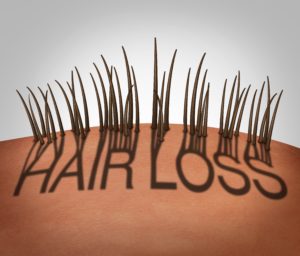
More and more studies are showing promise of the use of a class of drugs known as JAK inhibitors in the treatment of different types of hair loss.
JAK, or Janus kinase inhibitors are a group of drugs that work by inhibiting the Janus kinase family of enzymes (JAK1, JAK2, JAK3, TYK2), and thereby interfere with the JAK-STAT signaling pathway. Disruption of this cell signaling pathway can have profound effects on inflammation and the immune system. That is why these compounds have previously been employed to treat a variety of rheumatologic conditions such as arthritis.
However, the use of systemic JAK inhibitors have demonstrated impressive outcomes when used in patients with Alopecia areata. Alopecia areata is a common autoimmune condition where the body’s immune system targets the hair follicle, resulting in well-circumscribed patches of hair loss on the scalp and body. Variants of this disease include alopeica totalis and alopecia universalis.
In one study involving 66 patients, about one-third had greater than 50% scalp regrowth after being treated with a systemic JAK inhibitor for 3 months. In another trial, nine of 12 patients taking ruxolitinib experienced complete hair regrowth over a 6 month period.
The greater the amount of time the hair has been missing, the less regrowth these alopecia patients seem to experience. Furthermore, topical JAK inhibitor did not appear to be as effective compared to the systemic form of the drug.
Topical JAK inhibitors have however been noted to be useful in other forms of hair loss. Recent evidence suggest that inflammation in the scalp seems to push hair follicles into a resting phase via JAK signaling. Clinically, this might be appreciated as hair loss. JAK inhibitors, in contrast, seem to push the follicle back into anagen, or their growing phase.
In a study examining the effects of a topical JAK inhibitor on both male and female androgenetic alopecia (i.e. male pattern baldness and female pattern baldness), investigators found73% of subjectes experienced significant hair regrowth, with women showing more regrowth compared to men.
All of this is encouraging news and points to new therapies on the horizon for patients suffering from hair loss and the practitioners that often struggle to find effective treatments.
Previous Post Next Post